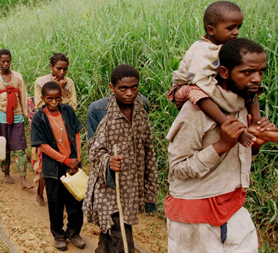Rwandan refugee: my story of Congo conflict
As a report is published detailing atrocities committed by foreign forces in Congo in the 1990s, a Rwandan journalist writing for Channel 4 News hears from a refugee of the conflict.

The United Nations has validated a report that details massive human rights violations in Democratic Republic of Congo between 1993 – 2003. The report was originally leaked in August – and after reading it I wanted to hear the human story behind the UN account, writes Rwandan journalist Yoletta Nyange.
Allegations of genocide, human rights abuses, and atrocities of an unspeakable nature fill the document, which the Rwandan president, has heatedly denied as “flawed”.
After the report was leaked in the summer, I couldn’t sleep for a week after reading all 509 pages.
I wanted to hear from somebody who could tell me what it was really like.
So, I travelled to Brussels. There I met James Mahoro [not his real name], who was just 12 when he had to leave Rwanda.
In 1994, James fled Rwanda to escape the genocide. Along with his mother and siblings, he ended up in the Mugunga refugee camp, in the border city of Goma, in Eastern DRC. His father was a church minister, and by early 1995 he found them a house in the city of Mbandaka.
For two years, they were the only Rwandan family in town. And then in May 1997, hundreds of Rwandan refugees arrived. James remembers being shocked at the sight of the mass of men, women, and children wearing ripped clothes, looking so dirty and crazed
“You could spell the word misery in their eyes,” he said.
“I said hello to a group of them in Kinyarwanda, and they surrounded me, touching my face, they couldn’t believe their eyes: a Rwandan boy looking healthy.
“Three days later, on 13 May 1997, early in the morning Rwandan soldiers drove their jeeps in town. We had been warned of their arrival by the authorities, and ordered all to remain indoors.
“The next thing we heard was bursts of gunfire – which lasted for four long hours. When all became quiet again, we tied white cloths on our heads as a sign of non-resistance and ventured in the street. I was a curious little rascal back then, so I jumped out but couldn’t go further than the gate of our house: there were dead bodies of Rwandans all over the street.”
That night the family of seven feared being discovered – so they split up, with each person spending the next three days hidden in different houses. Peeking out the window of his host’s house, James saw soldiers firing without discrimination.
“On 16 May, Red Cross trucks drove in town, collecting dead bodies and burying them in mass graves,” James told me.
After a week, his family were reunited.
“Our Congolese friends would often spend the night at our house, just to keep us company, and reassure us. Some ladies would cook meals for us too. I was petrified, but happy to be back with my relatives.
“One day, on the road I saw a soldier and heard him speaking Kinyarwanda (the main Rwandan language). That scared the hell out of me, I thought they would find out I was Rwandan and kill me. From then on, I made sure I was never walking in the street alone.”
James reached Europe in 2002. He has graduated as an accountant and now works for an energy company in Brussels. He is now married to a Rwandan nurse, a survivor, and they have two children. He has never returned to Rwanada, and he says he never will.
Yoletta Nyange is a Rwandan-born freelance journalist who has lived and worked in Belgium, UK, Venezuela and Tunisia. She speaks five languages and covers international affairs. Her work has been featured in media outlets worldwide. Her blog is here.